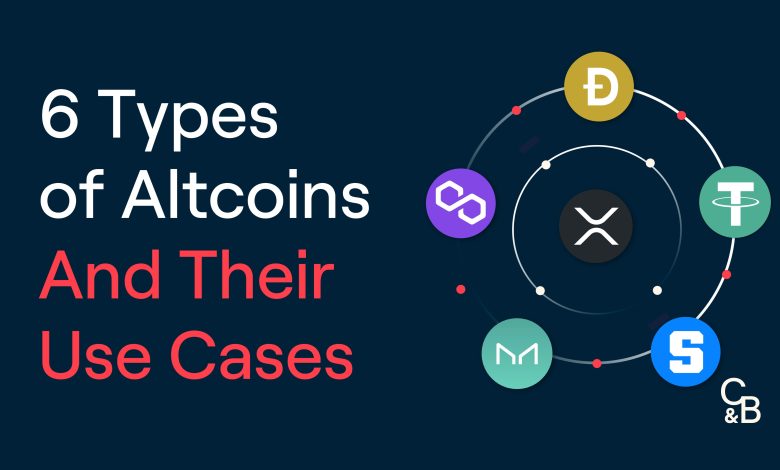What Are Altcoins and How to Invest in Them

- Understanding Altcoins and Their Role in the Cryptocurrency Market
- Exploring the Various Types of Altcoins Available to Investors
- Factors to Consider Before Investing in Altcoins
- Strategies for Investing in Altcoins and Managing Risk
- The Future of Altcoins: Trends and Predictions
- Tips for Successful Altcoin Investing in a Volatile Market
Understanding Altcoins and Their Role in the Cryptocurrency Market
Altcoins, or alternative cryptocurrencies, play a significant role in the cryptocurrency market. These digital assets are alternatives to Bitcoin, offering different features and functionalities. Understanding altcoins is essential for investors looking to diversify their portfolios and take advantage of the growing cryptocurrency market.
Altcoins can serve various purposes, such as improving upon Bitcoin’s technology, providing solutions to specific industries, or experimenting with new concepts. Some popular altcoins include Ethereum, Ripple, Litecoin, and Cardano. Each altcoin has its unique value proposition and use case, making it crucial for investors to research and understand the altcoins they are interested in.
Investing in altcoins can be a lucrative opportunity for those willing to take on the risks associated with the volatile cryptocurrency market. Before investing in altcoins, it is essential to conduct thorough research, assess the project’s team and technology, and consider the market demand for the altcoin. Diversifying your cryptocurrency portfolio with a mix of established coins like Bitcoin and promising altcoins can help mitigate risks and maximize potential returns.
Exploring the Various Types of Altcoins Available to Investors
When it comes to investing in altcoins, there are various types available to investors. These alternative cryptocurrencies offer unique features and functionalities that differentiate them from traditional coins like Bitcoin. Understanding the different types of altcoins can help investors make informed decisions about where to allocate their funds.
- Ethereum (ETH): Ethereum is one of the most well-known altcoins and is often considered the second most popular cryptocurrency after Bitcoin. It is a decentralized platform that enables smart contracts and decentralized applications (dApps) to be built and run without any downtime, fraud, control, or interference from a third party.
- Ripple (XRP): Ripple is a digital payment protocol that allows fast, low-cost cross-border transactions. It is designed to enable secure, instant, and nearly free global transactions of any size with no chargebacks.
- Litecoin (LTC): Litecoin is a peer-to-peer cryptocurrency created by Charlie Lee. It is often referred to as the silver to Bitcoin’s gold and is designed to produce blocks more frequently and with a capped supply of 84 million coins.
- Stellar (XLM): Stellar is an open-source, decentralized protocol for digital currency to fiat money transfers that allows cross-border transactions between any pair of currencies.
- Cardano (ADA): Cardano is a blockchain platform that aims to provide a more secure and scalable infrastructure for the development of decentralized applications and smart contracts.
These are just a few examples of the various types of altcoins available to investors. Each altcoin has its own unique features and use cases, so it’s essential to research and understand the specific characteristics of each before deciding where to invest. Diversifying a cryptocurrency portfolio with a mix of different altcoins can help spread risk and potentially increase returns over time.
Factors to Consider Before Investing in Altcoins
Before investing in altcoins, there are several factors to consider to make an informed decision. One important factor is the **volatility** of the altcoin market. Altcoins are known for their price fluctuations, which can be much more significant than traditional investments. It is crucial to be prepared for this **volatility** and have a risk management strategy in place.
Another factor to consider is the **liquidity** of the altcoin you are interested in. **Liquidity** refers to how easily an altcoin can be bought or sold without significantly impacting its price. Investing in illiquid altcoins can make it challenging to exit a position quickly, especially during times of market stress.
Additionally, it is essential to research the **development** team behind the altcoin. A strong and experienced **development** team can increase the likelihood of the altcoin’s success. Look for **projects** with a clear roadmap, regular updates, and a history of delivering on their promises.
Furthermore, consider the **use case** of the altcoin. Does it solve a real-world problem or offer a unique value proposition? **Altcoins** with a clear **use case** and strong **fundamentals** are more likely to succeed in the long run.
Lastly, take into account the **security** of the altcoin. **Security** is a significant concern in the cryptocurrency space, with many altcoins falling victim to hacks and **fraud**. Look for altcoins that prioritize **security** measures such as encryption, two-factor authentication, and regular security audits.
By carefully considering these factors before investing in altcoins, you can increase your chances of making a successful investment in this exciting and rapidly evolving market.
Strategies for Investing in Altcoins and Managing Risk
Investing in altcoins can be a lucrative opportunity, but it also comes with its fair share of risks. To mitigate these risks and maximize your chances of success, it is essential to implement effective strategies. Here are some key strategies for investing in altcoins and managing risk:
- Do thorough research before investing in any altcoin. Look into the project’s whitepaper, team members, roadmap, and community engagement to assess its potential for growth.
- Diversify your altcoin portfolio to spread out risk. Investing in a variety of altcoins can help protect your investments in case one project underperforms.
- Set clear investment goals and establish a solid exit strategy. Determine your target profits and losses before investing to avoid making impulsive decisions based on market fluctuations.
- Stay updated on market trends and news related to the altcoin industry. Being informed about the latest developments can help you make more informed investment decisions.
- Consider using stop-loss orders to limit potential losses. Setting stop-loss orders can automatically sell your altcoins if their prices drop below a certain threshold, helping you minimize losses.
- Avoid investing more than you can afford to lose. The altcoin market is highly volatile, and there is always a risk of losing your investment. Only invest money that you can afford to part with.
- Monitor your investments regularly and adjust your strategy as needed. Keep track of your altcoin portfolio’s performance and make changes to your investment strategy based on market conditions.
By following these strategies and staying disciplined in your approach to altcoin investing, you can increase your chances of success while managing risk effectively. Remember that investing in altcoins carries inherent risks, so always proceed with caution and do your due diligence before making any investment decisions.
The Future of Altcoins: Trends and Predictions
The future of alternative cryptocurrencies, or altcoins, is a topic of great interest and speculation in the world of digital assets. As the cryptocurrency market continues to evolve and mature, there are several trends and predictions that investors should be aware of when considering investing in altcoins.
One trend that is likely to shape the future of altcoins is the increasing adoption of blockchain technology across various industries. Many altcoins are built on blockchain platforms that offer unique features and functionalities, making them attractive to businesses looking to leverage the benefits of decentralized technology. As more companies and organizations begin to explore the potential of blockchain, the demand for altcoins that offer innovative solutions is expected to grow.
Another trend to watch in the world of altcoins is the rise of decentralized finance, or DeFi. DeFi projects are built on blockchain platforms and aim to disrupt traditional financial systems by offering decentralized alternatives to banking, lending, and trading. As the DeFi space continues to expand, there is a growing interest in altcoins that support these innovative financial applications.
In addition to technological advancements, regulatory developments are also likely to impact the future of altcoins. As governments around the world work to establish clear guidelines for the use and trading of cryptocurrencies, altcoin projects that comply with regulations are more likely to succeed in the long run. Investors should keep an eye on regulatory changes and consider how they may affect the value and viability of different altcoins.
Overall, the future of altcoins is full of potential and opportunity for investors who are willing to do their research and stay informed about the latest trends and developments in the cryptocurrency market. By keeping an eye on technological advancements, regulatory changes, and the growing popularity of DeFi, investors can position themselves to take advantage of the exciting opportunities that altcoins have to offer.
Tips for Successful Altcoin Investing in a Volatile Market
Investing in altcoins can be a lucrative opportunity, especially in a volatile market. Here are some tips to help you navigate the ups and downs of altcoin investing:
- Do your research before investing in any altcoin. Look into the team behind the project, the technology they are using, and the problem they are trying to solve.
- Diversify your altcoin portfolio to spread out risk. Investing in a variety of altcoins can help protect you from significant losses if one of your investments doesn’t perform well.
- Set a budget for your altcoin investments and stick to it. It’s easy to get caught up in the excitement of the market, but it’s essential to invest only what you can afford to lose.
- Stay up to date with the latest news and developments in the altcoin market. Being informed about market trends and events can help you make better investment decisions.
- Consider using stop-loss orders to protect your investments. Setting a stop-loss order can help you limit your losses if the market takes a downturn.
By following these tips, you can increase your chances of success in altcoin investing in a volatile market. Remember to stay informed, diversify your portfolio, and only invest what you can afford to lose.



